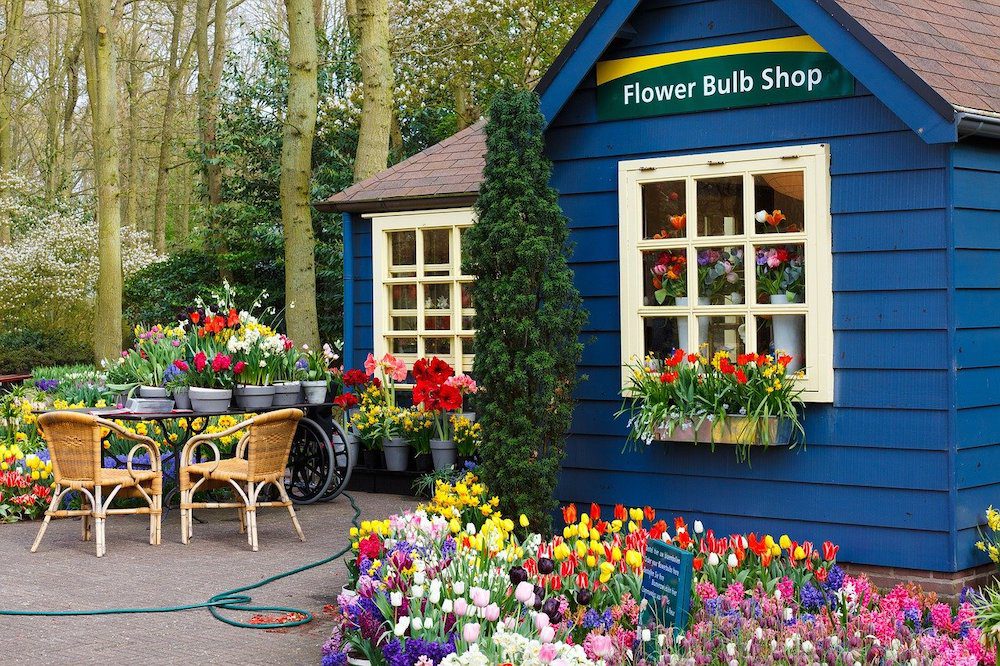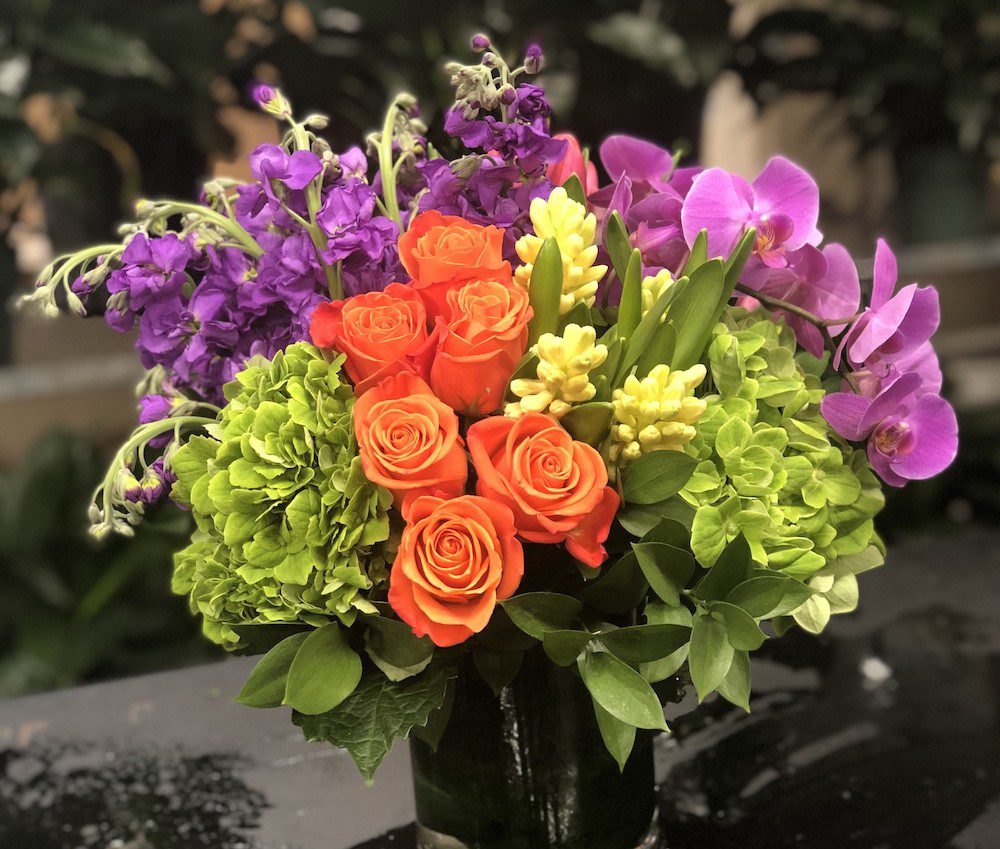Are Flowers Safe to Bring Home? You Bet and Good for You Too!
By Jill Brooke

In every household, there is one person who is Uber-strict and questions every single safety measure.
In my house, that is my son.
Because I am the flower girl, he felt we were putting our family at risk because I needed to get my supply of flowers which I need like others need oxygen.
As I pointed out, being a seasoned journalist who researches facts, plants are not cardboard or metal. The risk is low. The psychological boost – very high.
However, he argued, the plastic could have COVID-19 attached. Therefore, when I get my flowers from the grocery store – either Shoprite or Whole Foods – I bring the flowers into the sink and with gloves on, cut the plastic off the flowers and discard them into the trash.
But do I need to disinfect the flower stems?
“There is no research on the persistence of the virus on surfaces of flowers, but based on everything we know, the risk of contracting COVID-19 from flowers is less than negligible,” says Kate Penn, CEO of the Society of American Florists.
Furthermore, pointing to experts in virology, food safety and exposure science, SAF says these specialists are “unanimous – as well as US FDA and CDC – that Covid-19 cannot be transmitted with food packaging. “The simple answer is that Covid-19 cannot be transmitted with cut flowers.”
That’s good news. In fact, that’s great news.
And now what about flower arrangements from our beloved local floral shops?
Penn says that the shops SAF spoke with are following CDC guidelines about hygiene/sanitation and distancing.
Like flowers, floral shop owners are resilient adaptive people. For larger shops, there are multiple designers on staff creating separate work stations with separate tools so there is no mingling of materials. Smaller ones have less than two or three people.
Another safety measure is that the delivery drivers must go out by themselves to make deliveries vs. having someone in the van with them. These drivers also have the same car assigned to them.
“I’ve also heard about flowers stapling an alcohol wipe to the packaging on the arrangement, for the customer to use,” adds Penn.
What a considerate and enterprising touch.

As far as your favorite floral shop opening soon – since some florists without robust on-line capabilities are still shuttered – it is hopeful they can reopen soon. As a recent New York Times article pointed out, floral shops are quite safe. Unlike tech shops where people are pressing buttons and touching iPhones and Macs, flowers are something one experiences. The heavenly scents of lilac or freesia perfuming the room, the sights of magenta peonies popping from their buds clamoring for attention next to showy garden roses.
Nor are you are touching the Gerbera daisy or the soft fragile petals of parrot tulips. You are oohing and ahhing.
“Flowers are unlike durable consumer goods that may get handled by a customer, then put back on a rack or a shelf,” says Chris Drummond, who owns Penny’s by Plaza Flowers. “Instead, consumers almost always discuss the occasion and what colors or flowers they prefer. Sometimes they will point to the varieties they like, but its the florist who handles the flowers and makes the bouquet. The final, wrapped product is handed to the customer at the end of the transaction.”
Or delivered.
This is all good news since we know the positive psychological effects of flowers in our homes as well as in our gardens.

Here is a list provided by SAF on different states’ rules regarding flowers. It is constantly changing. California and Colorado are both states that recognize how florists are essential workers while others have stricter guidelines.
Whatever your state, remember your state of mind is improved with flowers and support your local florists and places that sell flowers and gardening supplies.
States with Exemptions, Limited or Full Operations for Retail Florists
- Alabama – businesses allowed to operate at half capacity
- Alaska – businesses allowed to operate at 25% capacity with social distancing and proper hygiene practices
- Arizona – delivery services and funeral services allowed to continue
- Arkansas – businesses open; customers have to follow guidelines and practice social distancing
- California – florists (explicitly mentioned) and some other retail will be able to open as soon as Friday 5/8 with modifications and if they follow guidelines of the state
- Colorado – retail allowed to open completely on May 1 under strict precautions
- Delaware – florists allowed to continue to deliver
- Florida – retail stores allowed to open May 4
- Hawaii – florists exempt
- Idaho – businesses can reopen if they meet business protocols
- Iowa – can reopen at 50% capacity and social distancing
- Indiana – call in ordering, online with delivery or curbside pickup
- Maryland – no contact delivery
- Massachusetts – can do online and phone orders
- Minnesota – delivery and curbside pickup
- Mississippi – businesses are allowed to remain open/ re-open if following safety guidelines
- Montana – retail businesses allowed to open if they adhere to requirements to limit capacity and maintain strict physical distancing
- Nevada – open for online operations with pickup and delivery
- New Hampshire – listed as essential
- New Jersey – online operations and delivery allowed
- New York – phone or online orders, only one employee present at the location to fulfill orders
- North Dakota – businesses reopened on April 30 if they adhere to protocols
- Oregon – allowed to be open if enforcing social distancing practices
- Pennsylvania – contact free delivery
- Rhode Island – phone and online orders, delivery
- South Carolina – online and phone orders, delivery or curbside pickup
- Tennessee – online and phone orders, delivery and curbside pickup
- Texas – designated as critical infrastructure, and can operate as “retail-to-go”
- Vermont – phased restart has allowed online; phone orders with delivery or curbside pickup
- Virginia – no more than 10 patrons per establishment
- Washington – deemed as essential but only for online and phone orders, delivery and curbside pickup
- West Virginia – open if you have 5 or less employees, or if you ship goods through commercial channels
- Wisconsin – non-essential businesses to open for deliveries, mailings, curbside pick-up and drop-off
Jill Brooke is a former CNN correspondent, Post columnist and editor-in-chief of Avenue and Travel Savvy magazine. She is an author and the editorial director of FPD.
